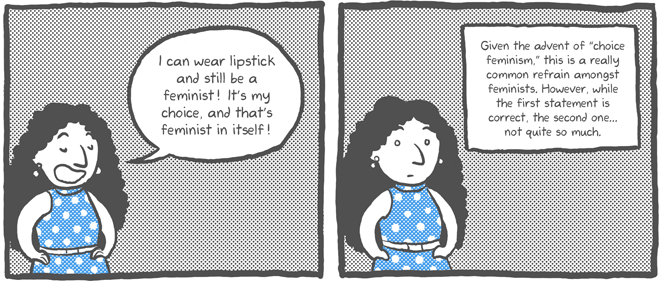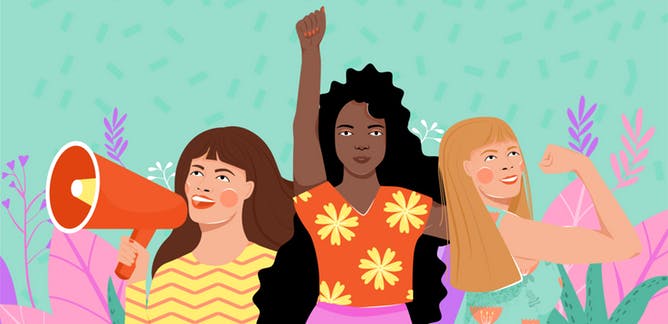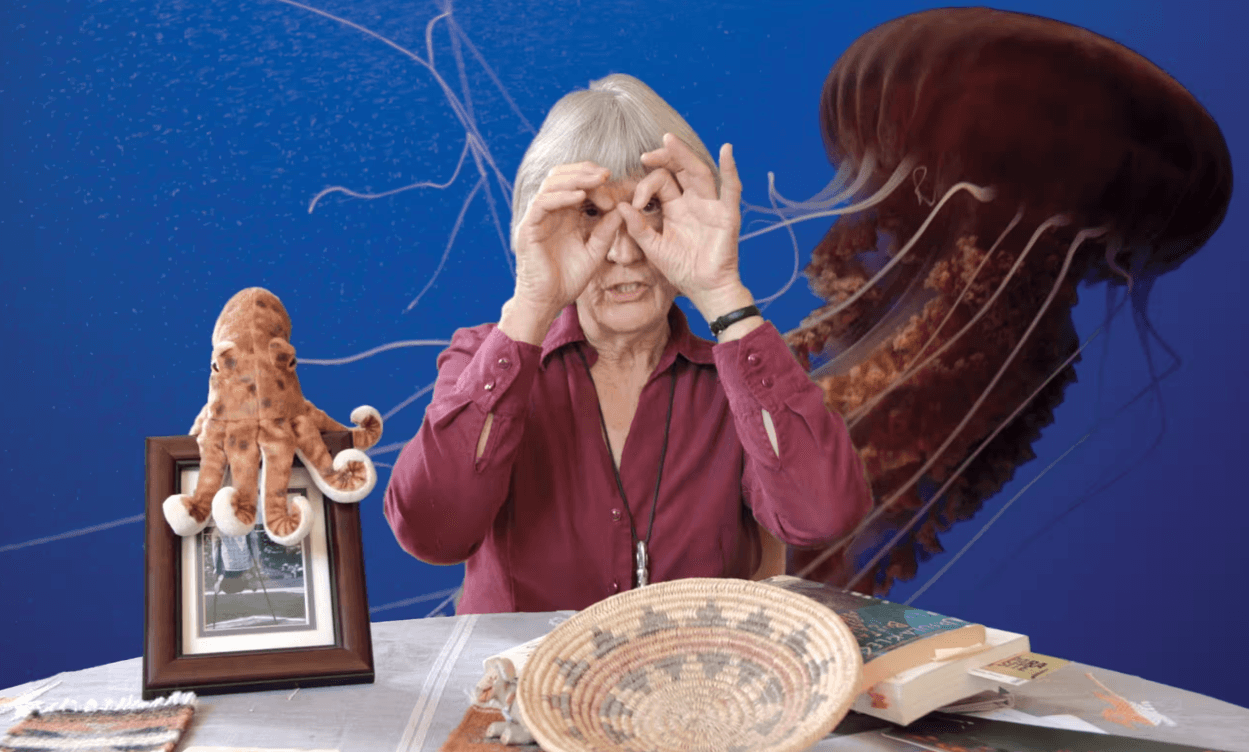Lately, a lot of us seem to feel politically empowered by labelling our actions “choices”, even if they are simply consequences of years and years of patriarchal values that have been instilled into us since our childhood. In this article, we explore choice feminism and how it hampers the cause of feminism.

What is Choice Feminism?
Choice feminism is a branch of modern-day feminism that lays emphasis on the agency of a woman in making decisions, both big and small. It is a more individual-centric approach than is feminism as a whole, which believes that empowerment can be found in the act of making a “choice”, however in line it may be even with ancient patriarchal norms.
CHOICE FEMINISM ALLOWS ANY ACTION TAKEN BY A WOMAN AS AN EXPRESSION OF HER AGENCY, AND THAT SHE SHOULD BE FREE FROM ANY FORM OF JUDGEMENT SINCE, IN MAKING A CHOICE, SHE IS INHERENTLY FEMINIST.
Choice feminism allows any action taken by a woman as an expression of her agency, and that she should be free from any form of judgement since, in making a choice, she is inherently feminist. While one may agree that judgement should be withheld in most circumstances, many disagree to the claim that the act of making a choice is automatically contributing to the cause of attaining equal rights for women. There is also considerable debate about what ‘choice’ means to women in spheres such as sex work, beauty and grooming, as well as familial and marital ties. However, before exploring this form of popular feminism, it is important to ask…
How Do We Define ‘Choice’ And ‘Agency’?
‘Choice’ is the act of selecting one or more possibilities from a list of two or more alternatives. ‘Agency’ can be understood as the degree to which a woman has sole influence over making said choice.
Choice feminism lays emphasis on the recognition of women as empowered agents who engage with different structures of power and manage to create a space for themselves. However, its conception of the terms ‘choice’ and ‘agency’ is often far from reality and also incomplete. We will discuss the many ways in which choice feminism is counterproductive to the cause of the emancipation of women.
Making A Choice Does Not Reflect Agency
The act of choosing is not directly related to having complete agency in making the choice. As Amartya Sen aptly describes, “Nothing can be more elementary and universal than the fact that choices of all kinds in every area are always made within particular limits”. This remains true and relevant for social and political discussions as well. In most cases, the capacity for a woman to determine her choice completely on her own is restricted. These restrictions come from a complex web of external factors that are beyond her control, such as the class or caste she is born into, how conservative or liberal her upbringing has been, and just to what degree she is privileged, to what degree marginalised.
The assumption that choice is equal to power is dangerous in many contexts, especially in that of sex work. Many choice feminists are under the impression sex work is dignified work if the woman voluntarily opted to work in that line of work. But what were the boundaries within which this choice was made? To what extent were her other alternatives better or worse than the one she chose?
According to Seeing Like a Feminist by Nivedita Menon, 71 per cent of women reported to have chosen sex work willingly as a form of income. But upon closer inspection, the motivations of having made this choice were: low pay from alternative occupations, seasonal nature of work, and an inability to run the house with the income other occupations provided. Sex work is the site of extremely poor working conditions, stigma, and exploitation of women workers. It is worth noting that most women who engage in it come from economically disadvantaged families who do not have access to education and thus are more vulnerable. If sex work is a resort they go to after chalking off even lesser economically attractive options, is it truly a “choice”? Does it not stem from the commodification of women’s bodies?
The assumption that choice is equal to power is dangerous in many contexts, especially in that of sex work. Many choice feminists are under the impression sex work is dignified work if the woman voluntarily opted to work in that line of work. But what were the boundaries within which this choice was made?
While there may be a selected few who choose sex work while having the means to pursue any other occupation, for example, there may be educated women with considerable financial backing who opt out of the conventional labour market and indeed have a preference for sex work. But they are very, very few in number. We cannot make generalizations about agency in sex work based on the exceptions who engage in sex work despite having other opportunities available to them.
Most sex workers, in addition to be economically disadvantaged, also come from marginalised castes. For certain tribes/castes, this is their traditional occupation and there is little room for exploring personal ambitions. They are also predominantly exploited by men belonging to the upper castes. Many sex workers start working at ages as young as 12 to 15. We cannot imagine that such young girls chose sex work free of force, after consciously evaluating their other options (if they were even available). Sex work could be a choice, but it almost never is.
Also read: Why Marriage Is A Personal Choice With Political Connotations
It Reinforces Patriarchal Norms
Choice feminism is especially dangerous because there is a sense of pride attached to making decisions, even if these decisions are actually reinforcing patriarchal values! Let us take the example of make-up and grooming for women. It is true that make-up can be empowering for trans women to really come into their own and express their femininity. But cis women who claim to “do makeup for themselves” are deluding themselves. Unless makeup is being used for some other artistic purpose, the only reason it would make someone feel better about themselves is because they feel more “beautiful”. There are many problems with this.
Firstly, being beautiful is an age-old established patriarchal pre-requisite to being a woman, amongst other things such as being delicate, submissive, and quiet. Secondly, most of us who use makeup do it in a way that it closely matches the set beauty ideal of the time. This beauty ideal is still constructed to cater to the male gaze, and by using makeup we are in fact perpetuating the value that women must be appealing to men. It is true that makeup has the power make us feel more confident. But we cannot forget that society has taught women to feel good about ourselves only when men find us pretty. Is it, then, truly a choice?
Similarly, hair removal and other forms of grooming encouraged only for women can also not be a choice. One might feel better with smooth, hairless skin, but it is only because we have been taught to feel disgusted with it in its natural form. Of course, letting go of these actions is very difficult. Recognising that none of these are truly “choices” does not mean we are immediately able to rid ourselves of it. Change is gradual, and while it is not particularly anti-feminist to take time in unlearning certain things, it is certainly anti-feminist to advocate for them by pretending that they are empowering.
It Has a Distorted Conception of ‘Freedom of Choice’
Choice feminism celebrates “freedom of choice”, making it, by default, exclusionary. There is stark disparity in how much freedom of choice a woman can exercise; it is not equal for everyone. Some women have freedom to “choose” their husband as long as he belongs to the same caste as her, and some young girls are not even able to negotiate the age at which they are married off to a strange family.
This form of feminism is too reductionist in nature, it separates the social context and underestimates how tight a grip it can have over countless women’s lives. Even some decisions that may appear to be conscious choices at the surface be still be a result of invisible social forces at play. A woman from a privileged background who has access to all the resources in the world may claim to have “chosen” to be a housewife. There are many implicit reasons underlying this “decision” of hers, such as an unspoken expectation from her to prioritise the needs of the household. After childbirth, a woman might claim she prefers to spend more time with her infant as opposed to working a 9-to-5 job.
But perhaps she never had the opportunity to decide because it was considered natural for her to stay at home and let her husband be the breadwinner instead. Perhaps she already went in with the expectation that she will eventually be a stay-at-home mother. Freedom of choice is thus too complex to ascertain the degree of. Most patriarchal norms have been so naturalised that we do not even consider that we may opt out of certain engagements.
Offers No Plan of Action For Obtaining Equal Rights
Choice feminism has the effect of stopping the conversation short. It asks no further questions once a woman has said, “but it’s my choice!”. It does not probe further into the intricacies of the decision-making process, but rather, applauds the act of choice-making without and concern for the effect it might have on the fight for women’s rights. This fight gets seriously hampered when choice feminism allows us to believe that women are already emancipated, that there is no need to make actual efforts to help them attain equal rights. It leaves existing power structures unthreatened, if not strengthened further by catering to their power and praising women for “choosing” to lend it more strength. Since it does not even attempt to identify a problem, it is far from framing steps to rectify it, thus leaving the status quo unchallenged.
Conclusion
Choice feminism lets us get comfortable with oppression. It is nothing but a delusion, and a potentially very harmful one at that. Pretending that a decision is our conscious choice will not suddenly liberate us. It should be accepted without question that the social context one lives in plays a significantly larger role in determining life choices than does the individual herself. Trying to combat the patriarchy through choice feminism is like trying to fight racism by saying “but I don’t see colour!”.
Also read: Motherhood As A Choice And Not An Inevitability
Choice feminism paints an incomplete picture of the lived experiences of women from different backgrounds. It is, at best, remotely relevant only to a narrow portion of women who can afford to exercise more freedom of choice, who are free from the restrictions that come with being a member of a more marginalised community.
Featured Image Source: The Conversation
About the author(s)
Manasi is a Gender & Sexuality campaigner at Jhatkaa.org. She is the former Digital Editor at Feminism in India and a researcher in the field of women and work. She hopes to keep learning and unlearning about feminism and intersectionality, and to create meaningful impact through her work.





A very good, insightful and important piece! Thanks to the writer for write such a detailed and descriptive piece with relevant examples. I consider myself to be a feminist but I too was caught in the web of “choice feminism”. This piece really made me introspect.
I think these views are toxic. You’re defeating the point of feminism by claiming that the women who make choices that do not help your ideology are not equipped to make those choices. That you know better. Maybe women can be women who live fully a life of love and power without following the template you have designed for her. So much hypocrisy in this way the ideology is pushed in and the individual woman is dismissed as an entity whose choice is questionable anyway, because you seem to know better, you want to tell her how to live her life, even when she insists she’d like to make her own choices. I could write an essay debating almost every sentence written in this post if I thought that would open up a good conversation about what a woman is and who can tell a woman how to live. I doubt that you’d be willing to examine things outside of your ideological template though.
P.s. I’m a woman, I do what I want, I live how I want, patriarchy doesn’t tell me what to do and neither do other women who say they know better about my choices and the ground from which my thoughts spring. If you call this choice feminism, go ahead, but the truth is I’m a woman and maybe I am intelligent enough to make my choices without the crutches of an ideology to support them.. hope this makes sense.
Absolutely agree to the fact that our society constricts our way of seeing the choices we have and the agency we exert but the inevitability is also something that we need to consider before coming to the conclusion about choice feminism. We need to understand that patriarchy has been reinforced and deeply ingrained in our heads and we can’t detach with it all at once. Just because activities like putting on makeup and choosing to remove one’s body hair adheres to patriarchal norms that does not mean one has to give it up to embrace feminism. I know women who apply makeup and get into skincare routines to get more in touch with their bodies, while makeup for others can also be therapeutic.Similarly the cause of body hair removal need not always be related to the disgust towards body hair. Similarly, a woman choosing to accept working at home should not be seen as a disregard to having agency because that argument claims domestic housework itself can’t be counted as labor and honestly is also problematic. Agreed that choice feminism has become an easy tool for people to claim the high moral ground but the larger point of it all is to remove the gender-ing related to all these normal acts and if one is aware of making the choices that they are, it doesn’t matter whether it adheres to the societal norms or not, it still counts as an act of agency.